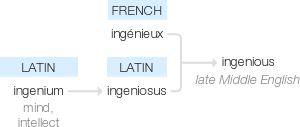Ingenious
late Middle English: from French ingénieux or Latin ingeniosus, from ingenium ‘mind, intellect’; compare with engine.
wiktionary
Borrowed from Middle French ingénieux, from Old French engenious, from Latin ingeniōsus(“endowed with good natural capacity, gifted with genius”), from ingenium(“innate or natural quality, natural capacity, genius”), from in-(“in”) + gignere(“to produce”), Old Latin genere. See also engine.
etymonline
ingenious (adj.)
early 15c., "intellectual, talented," from Old French ingenios, engeignos"clever, ingenious" (Modern French ingénieux), from Latin ingeniosus "of good natural capacity, full of intellect, clever, gifted with genius," from ingenium "innate qualities, ability; inborn character," literally "that which is inborn," from in- "in" (from PIE root *en "in") + gignere "to beget" (from PIE *gen(e)-yo-, suffixed form of root *gene- "give birth, beget").
Sense of "skillful, crafty, clever at contrivance" first recorded 1540s; earlier in this sense was Middle English enginous (mid-14c.), from Old French engeignos. Middle English also had engineful "skillful (in war)" (c. 1300). By a direct path, Latin ingenium produced Middle English ingeny "intellectual capacity, cleverness" (early 15c.), but this is obsolete. Compare engine. Related: Ingeniously; ingeniousness.
